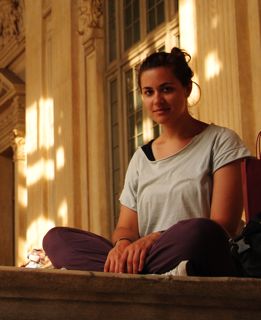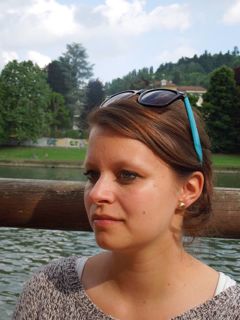Photos: the author
Polina Spartyanova
Marita Karagianni is 25 years old and studying Civil Engineering at the National Technical University of Athens. The young Greek student is an active participant in the non-governmental sector in Greece, but only a month ago she was involved in her first international project, which took place in Italy. It was funded by the European "Youth in Action" programme and its aim was to provide greater awareness of how gender relations affect young people in their daily lives. "For the first time in my life I got out of my comfort zone because I did not know anyone in this environment and, within a week, I had to live with  23 strangers. In addition, I had to constantly communicate in English, which was also a totally new experience for me," Marita told GRReporter. The participation in the "Youth in Action" programme funded by the European Union (EU) removes the boundaries and differences between the European nations. In this project, there is no divide between countries, either by culture or by language, because in the majority of the cases the selected participants are active young people who aspire to a united Europe.
23 strangers. In addition, I had to constantly communicate in English, which was also a totally new experience for me," Marita told GRReporter. The participation in the "Youth in Action" programme funded by the European Union (EU) removes the boundaries and differences between the European nations. In this project, there is no divide between countries, either by culture or by language, because in the majority of the cases the selected participants are active young people who aspire to a united Europe.
"Youth in Action" is part of the new EU "Erasmus +" programme, covering areas such as education, youth and sports in Europe and, in the next programming period (2014-2020), it will fund projects totalling 14.7 billion euro. Moreover, while most of the funds of the other EU programmes have been cut because of the economic stagnation, the funds for this programme mark a 40% increase compared to its previous levels, reflecting the EU's commitment to invest and develop this type of activity within Europe. Thanks to the allocated funds, over the next seven years "Erasmus +" will enable four million Europeans to study, train and gain work experience in various fields as well as to volunteer abroad.
Pia Herter is 22 years old and is one of the many young Europeans, who are taking advantage of the unlimited opportunities provided by "Erasmus+" and thanks to it she will spend the next term of her  education in Copenhagen. Just a month ago, the German student took part, along with Maria, in the same project funded by "Youth in Action" and coincidentally, they shared a room. "The intercultural communication gave me a great opportunity to get to know these young and active people who, among other things, are socially involved in their communities. I learnt a lot on the project topic but during this one week, I enjoyed the cosy international atmosphere the most," Pia told GRReporter.
education in Copenhagen. Just a month ago, the German student took part, along with Maria, in the same project funded by "Youth in Action" and coincidentally, they shared a room. "The intercultural communication gave me a great opportunity to get to know these young and active people who, among other things, are socially involved in their communities. I learnt a lot on the project topic but during this one week, I enjoyed the cosy international atmosphere the most," Pia told GRReporter.
The projects funded by the European "Youth in Action" programme are intended for young people aged between 14 and 31 years, and each of them aims within a week to bring closer different nations on a topic concerning the EU policies. Each project provides the participants with accommodation and food during their stay and covers 70% of their travel costs. Through these basic rules, "Youth in Action" manages to stimulate the active European citizens, promoting solidarity and tolerance among young people of different nationalities. These initiatives promote the European cooperation in the field of youth policy, providing young Europeans with the opportunity of becoming part of the EU society, and not just of the communities of their own countries. In this one week, the participants are able to forget about the differences between themselves and rise above the stereotypes of their own countries. Only within a project under the "Youth in Action" programme can you talk with young German citizens about historical events like the Holocaust, with unemployed young people from Greece about their future realization on the labour market and with Bulgarians who are not afraid to talk about Bulgaria as a leading country in the negative statistics of the European Union.
Within a week, Maria and Pia were living together in a peaceful and friendly atmosphere, ignoring their differences and nationality. While the leaders of Germany and Greece have been trying in every way to calm the passions between the two nations in recent years, a project like this one, in which they both participate, very successfully promotes the values of the European community. "Thanks to our conversations about this Greek-German situation I was able to much better understand the conflict between the two countries," said Pia, adding that she did not experience any problems while living together with a representative of the Greek nation. Marita in turn does not perceive her roommate as "German," but rather as "a person of principles and beliefs who was simply born in Germany." Ultimately, both agree that thanks to this project, they have learnt many things about the world around them and greatly appreciate the fact that they have been able to learn totally new things about themselves.
"Youth in Action" is not one of those projects that are completed after a seven-day stay in one place. It continues for years regarding those who participate in it, as many of them form lasting friendships with each other and continue to learn from each other for years. The benefit for young Europeans from these type of projects is at least the fact that whenever they travel they can find a friend within united Europe to share their city with and even their couch.